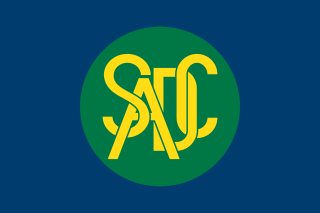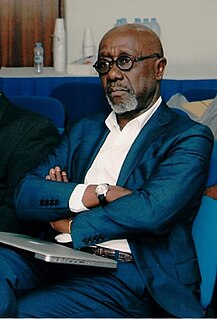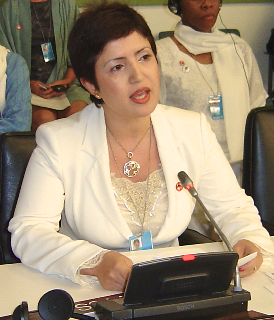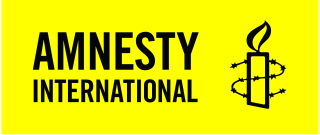External links
| By province | |||||||
|---|---|---|---|---|---|---|---|
| Political movements |
| ||||||
| Trade unions and Social movements | |||||||
| Law | |||||||
| Political culture |
| ||||||
| Other |
| ||||||
| Type | Non-Governmental Organisation |
|---|---|
| Industry | human rights |
| Founded | 1991, South Africa |
| Headquarters | Pretoria, South Africa |
| Products | Lobbying, research, consultancy. |
| Revenue | R?(2005) |
| Website | www.amnesty.org.za |
Amnesty International South Africa (AI SA) is a South African organisation that works to end human rights abuses along with its affiliate organization Amnesty International.
Amnesty International South Africa was founded in 1990 and grew from modest beginnings to become a key player in South Africa's transition to democracy and an important part of Amnesty's international movement, hosting the Amnesty International ICM in 1997. Today Amnesty International South Africa continues to campaign on multiple fronts including human rights education, women's rights, arms control and Zimbabwe.
Amnesty International did not have a group presence in South Africa up to the end of the 1980s because mixed race meeting were not allowed under the apartheid regime. However, there were individual members linked to London. It was only in 1990 when the local situation improved with a reduction in repression and the unbanning of the ANC and its allied organisations, that the International Secretariat allowed the formation of groups in the country.
In 1990–92, four groups started around the country - Port Elizabeth was the first group, followed by Durban, Pietermartizburg and Pretoria. Members from these groups met in 1993 to form a national coordinating committee (some representatives Piotr Nowosad and Linda Stiebel). By that time there were additional groups in Cape Town, Johannesburg and Grahamstown. A national office was opened in Cape Town in 1995 and this moved to Pretoria in 1998. By that time a Board had taken the place of the NCC. A director was appointed for the first time in 2001.
Amnesty South Africa's achievements in the 1990s included lobbying to abolish the death penalty; developing a national police human rights training programme focusing on children's rights; and lobbying to stop South African arms sales to states such as Turkey, Rwanda and Burundi, whose human rights records were questionable. In 1995 Pierre Sane, Amnesty International's secretary general, visited South Africa and met the deputy president Thabo Mbeki to discuss human rights abuses in South Africa, Nigeria and the African Great Lakes region. In 1997, Amnesty South Africa hosted the international movement's ICM meeting in Cape Town, also attended by nobel prizewinner Archbishop Desmond Tutu.
In 2006 the membership at the AGM voted for the Programme for Growth which allowed the International Mobilisation Fund, based at the International Secretariat, to take over governance and management of the organisation for a period of 2–3 years.
Amnesty International South Africa runs a national human rights education programme , campaigns strongly to stop violence against women and against human rights violations in Zimbabwe .
The Darfur conflict in Sudan is one of Amnesty International's top priorities, as a result of the large scale human rights abuses occurring. Amnesty has called for the introduction of a United Nations peacekeeping force to prevent conflict and stop further unnecessary suffering.
The Truth and Reconciliation Commission (TRC) was a court-like restorative justice body assembled in South Africa in 1996 after the end of apartheid. Witnesses who were identified as victims of gross human rights violations were invited to give statements about their experiences, and some were selected for public hearings. Perpetrators of violence could also give testimony and request amnesty from both civil and criminal prosecution.

The Southern African Development Community (SADC) is an inter-governmental organization headquartered in Gaborone, Botswana. Its goal is to further regional socio-economic cooperation and integration as well as political and security cooperation among 16 countries in southern Africa.

Apartheid was a system of institutionalised racial segregation that existed in South Africa and South West Africa from 1948 until the early 1990s. Apartheid was characterized by an authoritarian political culture based on baasskap, which ensured that South Africa was dominated politically, socially, and economically by the nation's minority white population. According to this system of social stratification, white citizens had the highest status, followed by Indians and Coloureds, then black Africans. The economic legacy and social effects of apartheid continue to the present day.
The Central Intelligence Organisation (CIO) is the national intelligence agency or "secret police" of Zimbabwe. It was conceived as the external intelligence-gathering arm of the British South Africa Police Special Branch in the early 1960s, under the Southern Rhodesian Prime Minister, Winston Field.

Pierre Sané is the Founder & President of Imagine Africa Institute was UNESCO’s Assistant Director-General for Social and Human Sciences from May 2001 - June 2010. He was Secretary General of Amnesty International from October 1992 to April 2001.
Contributing to the establishment of human rights system in Africa are the United Nations, international law and the African Union which have positively influenced the betterment of the human rights situation in the continent. However, extensive human rights abuses still occur in many sections of the continent. Most of the violations can be attributed to political instability, racial discrimination, corruption, post-colonialism, economic scarcity, ignorance, illness, religious bigotry, debt and bad financial management, monopoly of power, lack/absence of judicial and press autonomy, and border conflicts. Many of the provisions contained in regional, national, continental, and global agreements remained unaccomplished.
Amnesty International New Zealand is a part of the Amnesty International network, an international nonprofit organisation working to end human rights abuses. It is one of over 70 nationally organised sections or national offices of the global Amnesty movement.

There were widespread reports of systematic and escalating violations of human rights in Zimbabwe under the regime of Robert Mugabe and his party, ZANU-PF, between 1980 and 2017.
The South African Civil Cooperation Bureau (CCB), was a government-sponsored counterinsurgency unit, during the apartheid era. The CCB, operated under the authority of Defence Minister General Magnus Malan. The Truth and Reconciliation Committee, pronounced the CCB guilty of numerous killings, and suspected more killings.

Women of Zimbabwe Arise or WOZA is a civic movement in Zimbabwe which was formed in 2003 by Jenni Williams to provide women, from all walks of life, with a united voice to speak out on issues affecting their day-to-day lives, empower female leadership that will lead community involvement in pressing for solutions to the current crisis, encourage women to stand up for their rights and freedoms and lobby and advocate on those issues affecting women and their families.
The Centre on Housing Rights and Evictions (COHRE) was a Geneva-based international non-governmental organisation founded in 1994 by Scott Leckie as a foundation in the Netherlands.

Widad Akreyi is a Kurdish health expert and human rights activist. She has co-founded the human rights organization Defend International and is the author of several books about both health issues and human rights.
People Against Suffering, Oppression and Poverty (PASSOP) is a community-based, grass roots non-profit organisation fighting for the rights of asylum seekers, refugees and immigrants in Cape Town, South Africa.

Amnesty International is an international non-governmental organization focused on human rights, with its headquarters in the United Kingdom. The organization says it has more than ten million members and supporters around the world.

Kumi Naidoo is a human rights and environmental activist.

Salil Shetty is an Indian human rights activist who was the Secretary General of the human rights organization Amnesty International (2010–2018) till 31 July 2018. His tenure at Amnesty International was marred by significant controversy surrounding the organization's Global Transition Programme and the prevalence of a toxic workplace culture, which was later found to have contributed to the suicide of employee Gaetan Mootoo. Previously, he was the director of the United Nations Millennium Campaign. Before joining the UN, he served as the Chief Executive of ActionAid. In September, 2021, Shetty will become the Vice President of Global Programs at the Open Society Foundation.

Katherine Emily Holt is a British photojournalist, who works primarily across Africa and the Middle East to gather humanitarian and development stories for NGOs and private companies, as well as the UK and global media. She is also the director of communications agency, Arete.
A human rights group, or human rights organization, is a non-governmental organization which advocates for human rights through identification of their violation, collecting incident data, its analysis and publication, promotion of public awareness while conducting institutional advocacy, and lobbying to halt these violations.

Gays and Lesbians of Zimbabwe (GALZ) is an organisation established in 1990 in Harare to serve the needs of the lesbian, gay, bisexual, transgender and intersex (LGBTI) community in Zimbabwe. GALZ's vision is "a just society that promotes and protects human rights of LGBTI people as equal citizens in Zimbabwe".